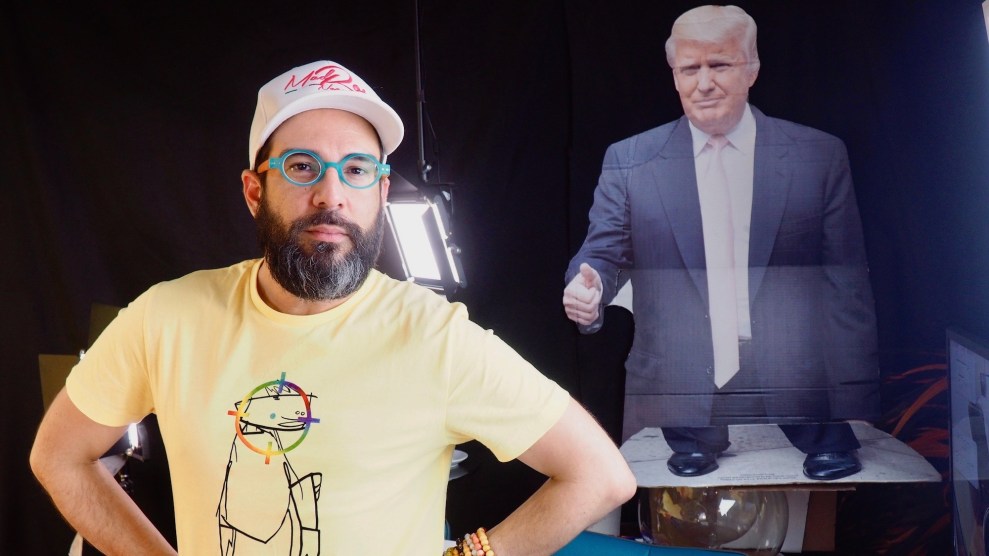
Otaola standing in front of a Donald Trump cutout in his studio last month.Noah Lanard/Mother Jones
The lobby of the Four Ambassadors condo building in Miami wouldn’t look out of place in a Trump property. There are marble floors, fountains, chandeliers, and views of an outdoor pool facing the water. Over the years, the complex has hosted Martin Luther King Jr., the White House press corps, and Nicaraguan contras and their CIA handlers. These days, the action takes place behind what could easily be mistaken for a closet door off the lobby.
On the other side of that door is a tiny studio, a sizable portion of which is consumed by a life-size cardboard cutout of President Trump. There are Latinos for Trump placards strewn about, and a blown-up image of the president on the wall. In the production booth hangs a painting of Alex Otaola, the YouTube star whose legions of Cuban American fans could help Trump win Florida and possibly the election.
Otaola arrived more than fashionably late, wearing glasses in Dolphins aqua and orange, a baseball cap in place of the fashion turbans he sometimes favors, and a forearm full of beaded bracelets that shook like a maraca on the frequent occasions when he grew animated.
After an initial interview, I watched Otaola’s fifth live broadcast of the week from the booth. Over the course of three frenetic hours, Otaola, speaking in Spanish, attacked left-wing Cuban media, told viewers how to register to vote, gossiped about Cuban reggaetoneros, derided Black Lives Matters as a bunch of Marxists, belted out a song, and reminded people to vote again. Three full-time producers crammed into the booth laughed incredulously at their boss’ antics, played ominous music for the villains (Democrats, the Cuban government), hollered when Otaola needed a studio audience, and served as the judges of a Zoom karaoke contest that happened as news broke of Ruth Bader Ginsburg’s death, which barely registered among them.
More than 100,000 people would end up watching a spectacle that mashed together elements of The Jerry Springer Show, Judge Judy, Entertainment Tonight, and Breitbart. Typically, they are younger Cuban immigrants like the 41-year-old Otaola. If Trump squeezes out a win in Florida, Otaola and his generation of Cubans will be among the people he has to thank. Older Cubans, who fled after Fidel Castro took power in 1959, are generally considered the reliable Republican voting bloc. But the younger generation has moved sharply to the right in the Trump years: A recent poll found that 56 percent of recent Cuban immigrants were planning to vote for Trump this summer, up from 22 percent four years earlier.
There are a number of factors responsible for this shift, but some prominent members of Miami’s Cuban community credit a new crop of right-wing media personalities promoting Trump—in particular Otaola.
“Oh my god,” Maria Elvira Salazar, a Republican running for Congress, told me outside her Little Havana campaign office. “He’s the one changing the newly arrived Cubans from Democrats to Republicans. He is the one.”
A few minutes after I spoke to Salazar, Arlene Paredes walked out of the campaign office after attending a job fair that Otaola had plugged on his show. Like Otaola, she’d moved to the United States in 2003. Had she heard of him? “Of course,” she said. “He’s the best YouTuber in Miami.” She watches his show every day. The whole thing—nearly 15 hours of Otaola a week. Paredes voted for Hillary Clinton in 2016. Otaola changed her mind. She’s voting for Trump. Her Cuban American husband, who didn’t vote in the last election, is too.
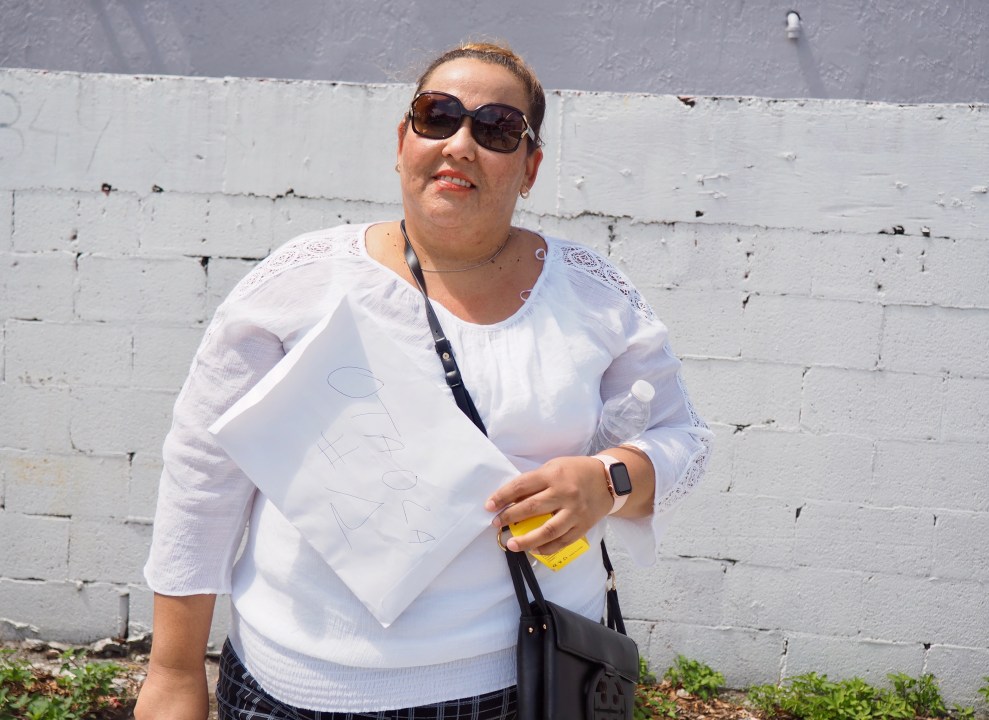
Arlene Paredes stands outside Maria Elvira Salazar’s campaign office after writing “Otaola #1” on the envelope she brought to the job fair.
Progressives have had good reason to hope that more recent Cuban immigrants would help end Republicans’ dominance among Cuban voters in Florida. It’s a group that’s been more likely to support ending the embargo, to travel back to the island, and to send remittances to family members. In August 2016, Cubans who arrived in the United States since 1995 favored Clinton by a more than two-to-one margin, according to Florida International University’s long-running and highly respected Cuba Poll.
Two years later, that had flipped. The next Cuba Poll, which surveys the attitudes of South Florida’s Cuban population every two years, found that more recent arrivals had just voted for Republicans by a roughly two-to-one margin in the midterms. Otaola, who switched parties in 2018, was part of that shift. Equis Research, a Latino-focused polling company, found last year that party identification among Cubans who have arrived after 1993 swung 50 points towards Republicans between 2016 and 2019. “While we wouldn’t stake too much on the exact size of the swing, given smaller sample sizes,” Equis wrote in July, “the trend is undeniable.”
On Friday, the latest installment of the Cuba Poll backed up Equis’ findings. The survey found that among Cubans who came to the United States between 2010 and 2015, 76 percent are Republicans and only 5 percent are Democrats. Overall, Biden has made up some ground among Cubans since the Cuba Poll was conducted this summer. Still, the cohort of Cuban immigrants that was supposed to be the friendliest to Democrats now appears to be the most Republican one.
That’s particularly important because Cuban Americans who have arrived since 1995 make up about 45 percent of Miami-Dade County’s Cuban community, which includes nearly 500,000 registered voters, or about a third of the electorate. (Cuban Americans account for about 5 percent of registered voters statewide.) Those who are registered overwhelmingly say they’re definitely planning to vote in November, by a margin of 89 to 1.
Even within one section of one demographic group, large shifts can make the difference in a state like Florida. In 2000, Miami Cubans’ vehement opposition to President Bill Clinton’s decision to return Elián González to his father in Cuba helped cost Al Gore the presidency. In 2012, Barack Obama beat Mitt Romney among recent Cuban immigrants—and roughly tied him among all Cubans according to exit polls—and won the state by about 75,000 votes. In 2018, Democrats Bill Nelson and Andrew Gillum lost their respective Senate and gubernatorial bids by less than half a percentage point each; in Miami-Dade County, both experienced their biggest drop-offs from Clinton’s 2016 results in heavily Cuban areas.
Today, Joe Biden leads by 3.5 points in RealClearPolitics’ average of Florida polls. Then again, at this point in 2016, Clinton was leading by 2.3 points and she ended up losing the state by 1.2 points. Once again, the election could come down to a key slice of Cuban voters.
Sitting in his studio, Otaola told me in Spanish that his first jobs after coming to the United States in 2003 were at places like Walmart and Pollo Tropical, a fast-food chicken chain. Two years later, he bought a modest townhome just outside Miami. For him and his audience, who know his story like they would a friend’s, his success is proof that the American Dream is still alive.
Like the president, Otaola told me he’s always been drawn to provocation. “To be born gay in a machista society like Cuba’s,” he explained, “is to be a provocateur from birth.” He likes to tell the story of how his university application was rejected by a man who called him a maricón de mierda, a fucking faggot. He had a brief career in TV, radio, and theater in Havana before leaving for Florida in his twenties via a visa lottery. In Miami, he landed bit parts in soap operas and dubbed shows like South Park into Spanish before making his name on gossipy talk and variety shows.
After the 2016 election, Otaola expressed his disgust at the result on Instagram. In a post denouncing Trump’s “extremely divisive” and “hate filled” campaign, he concluded in all-caps, “AMERICA HAS SPOKEN AND IT WILL GET WHAT IT DESERVES.”
Spurred on by what he called the supreme “mediocrity” of Spanish-language television executives, he started his YouTube show, Hola! Ota-Ola, the next year. “I’m everything here,” he said. “I’m an actor. I’m a political analyst. I’m an art critic. I’m a censor. I’m a judge…It’s a perfect job.”
His idea was always to mix pop culture with politics, which at first meant mostly Cuban politics. Guennady Rodriguez, a fellow Cuban immigrant who now edits a Spanish outlet called 23 y Flagler, said Otaola’s initial success came from tapping into Miami Cubans’ frustration with Cuban celebrities who made good money in the United States without taking a stand against the island’s government. Otaola named names and succeeded in getting the concerts of Cuban performers canceled.
At first, his tone could be earnest. In a March 2018 interview with Salazar, the Republican congressional candidate who is challenging Rep. Donna Shalala again after losing to her two years ago, Otaola criticized both parties and challenged her to explain why prescription drugs are so expensive in the United States. When Salazar blamed Democrats for the state of affairs in Cuba, Otaola countered, “Now, you have all the power.” Politicians from both parties, Otaola told his guest, used Cuba and its communism to win the votes of Cuban Americans. “And then nothing happens,” Otaola continued. “There’s been no change. No benefits.”
After the 2018 election, Otaola quickly became relentlessly pro-Trump. By February 2019, he was yelling “bravo!” and “hallelujah” in response to a clip of Trump saying Cuba, Venezuela, and Nicaragua would soon be free. “We’re proud of you, Mr. President,” Otaola told the cardboard Trump cutout that remains in his studio. “Can I give you a kiss?”
Many recent Cuban immigrants abandoned the Democratic Party as it shifted leftward under the sway of politicians like Sen. Bernie Sanders and Rep. Alexandria Ocasio-Cortez, who proudly embrace democratic socialism—a term that sounds enough like the communist regimes they fled to turn them off, even if the policy proposals are worlds apart. Otaola has said Ocasio-Cortez’s rise made him a Republican, though many of Otaola’s critics suspect the rightward turn was designed to boost ratings. Either way, the switch has been a good career move. Instead of posing tough questions to Salazar, he now profits from paid ads from her campaign.
He also draws far more attention. In February, Otaola organized a pro-Trump caravan that attracted as many as 2,000 cars, the Miami Herald reported. This spring, Otaola interviewed John Barsa, the acting head of USAID, for a segment that the federal development agency said was designed to “counter the Cuban regime’s disinformation.” In July, Otaola led another caravan in support of the Miami police. His latest project is trying to help launch a Cuban political party to free Cuba through means that remain unclear.
Plenty of Miami area Cubans haven’t heard of Otaola, but just about everyone I talked to in his target demographic had. At a watch kiosk in a mall in the heavily Cuban city of Hialeah, I asked Yanetzy, a 24-year-old who’d moved from Cuba a few years ago, what percentage of Cuban immigrants her age were familiar with Otaola. “All the Cubans know his name,” she responded. “Some follow him, other ones not. But everybody knows about him.”
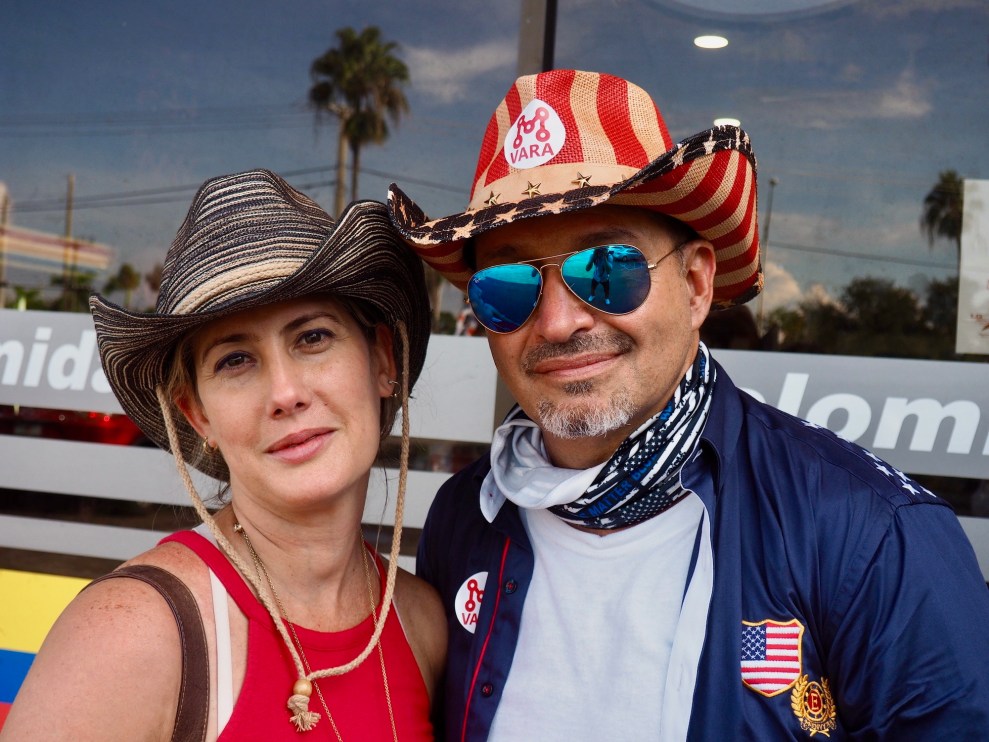
Anabel Ramos, left, a recent Cuban immigrant whose parents watch Otaola’s show, with her partner Alberto Perosch, a Venezuelan American fan of Otaola’s.
Carlos Odio, Equis Research’s co-founder and the grandson of a Cuban president, remembers the first time Otaola’s name came up during a focus group of recent Cuban immigrants. It caught people off guard. Several of the observers in the room had to ask, “Who’s Alex Otaola?”
Ricardo Herrero, the head of the Cuba Study Group, said that Otaola was a constant presence in those discussions among recent arrivals. “Otaola is one of them,” Herrero said. His fans identify with his self-made image and believe his bleak assessment of life in Cuba because they’ve lived it. So when Otaola talks about American politics, a subject they know less about, they’re more likely to believe him, Herrero explained. He’s helped create a permission structure for supporting the president they see getting criticized on Univision and Telemundo.
Still, he adds, we have no idea how many voters Otaola is actually swaying. For starters, we don’t know how much of his audience is in Florida and how many of the Florida viewers actually vote. And then there’s the fact that his generation had already lurched to the right in 2018, before Otaola’s show became a Trump-loving spectacle, due to a changing perception of the Democratic Party.
Over the course of a week in Miami last month, I was inundated by warnings—over the radio, Facebook, YouTube, WhatsApp, and in person—that Democrats are pushing the country toward the socialism that Cubans, Nicaraguans, and Venezuelans came to the United States to escape. In 2018, Florida Republicans falsely branded Gillum as a socialist, to great effect. Now they’re continuing that message in the presidential race, even though Democrats nominated a 77-year-old moderate.
The socialism attack is particularly potent because Democrats are running against someone who Cuban Americans believe is great for the economy. The 2020 Cuba Poll found that 68 percent of post-1995 immigrants strongly support Trump’s handling of the economy, compared to 10 percent who strongly oppose it.
Trump also gets high marks for returning to a hardline stance toward Cuba. Part of the problem for Democrats is widespread frustration in Miami that Obama’s engagement with Cuba did not lead to economic and political reforms. As the new Cuba Poll states bluntly, “Cubans here and on the island expected great changes and they never came.”
Republicans and the Trump administration have been a near-constant presence in Miami. “The Republican Party makes Cubans feel very, very important,” said Guillermo Grenier, the Florida International University sociologist who has been conducting the Cuba Poll since 1991. “The Democrats don’t know how to do that.” His colleague at FIU, the political scientist Eduardo Gamarra, cited research from one of his graduate students showing that Cuban Americans feel even more influential under Trump than they did under Ronald Reagan, who has long been a hero to Cuban exiles.
To win back voters, Trump’s critics in Florida have sometimes tried to paint him as an autocrat in the vein of Castro or Hugo Chávez. But in focus groups, Equis found, those attacks have tended to backfire: Many recent Cuban immigrants are offended by the comparison, and some see Trump’s similarities to the typical caudillo as a plus.
I saw that firsthand at a pro-Trump event in Hialeah, where someone wore a MAGA-style hat that read “Trump es un pingu.” A Venezuelan Republican translated the slang somewhat bashfully. It meant that Trump has a big dick, but it was intended to convey that he gets things done. He’s their strongman.
Otaola’s strength lies in his ability to take all these themes and package them into a show that can appeal to people without a particularly deep interest in politics. You can tune in for the video of him bottle-feeding his new baby squirrel monkey, Karma Otaola, then stay for the instructions on how to vote Republican.
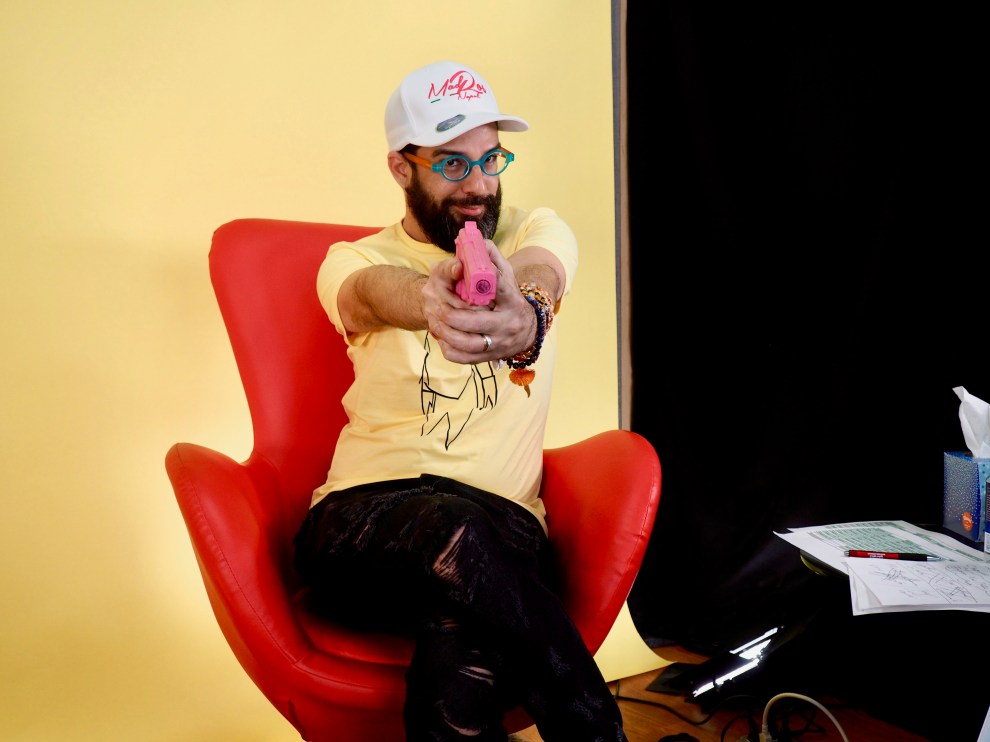
Otaola, who also owns real guns, poses with the plastic pistol he keeps in his studio.
Otaola’s guest on the day I watched his show from the booth was the hunky Cuban actor Pedro Moreno. “Alex, there’s a party that’s pushing socialism, and they want to impose it here in the United States,” Moreno said. “Trump is the vehicle against that, and I have to vote for Trump.”
From there, they pivoted to Black Lives Matter, which Otaola has depicted as a left-wing insurrection intent on toppling American democracy as part of a conspiracy to take down Trump by creating chaos. Where’s George Soros? Otaola asked in one June episode. (At a Trump campaign event I attended in Miami, a Cuban American radio host echoed the criticism of the major Democratic donor, who is frequently the target of anti-Semitic attacks, by using her fingers to make devil horns.)
One of the founders of the Black Lives Matter movement, Moreno warned, had appeared in a photo with Venezuelan President Nicolás Maduro. Otaola agreed that the founders were Marxists, then steered the conversation to Cuba. In a matter of minutes, Black Lives Matter, Democrats, and the Cuban government had been stacked into a communist leviathan.
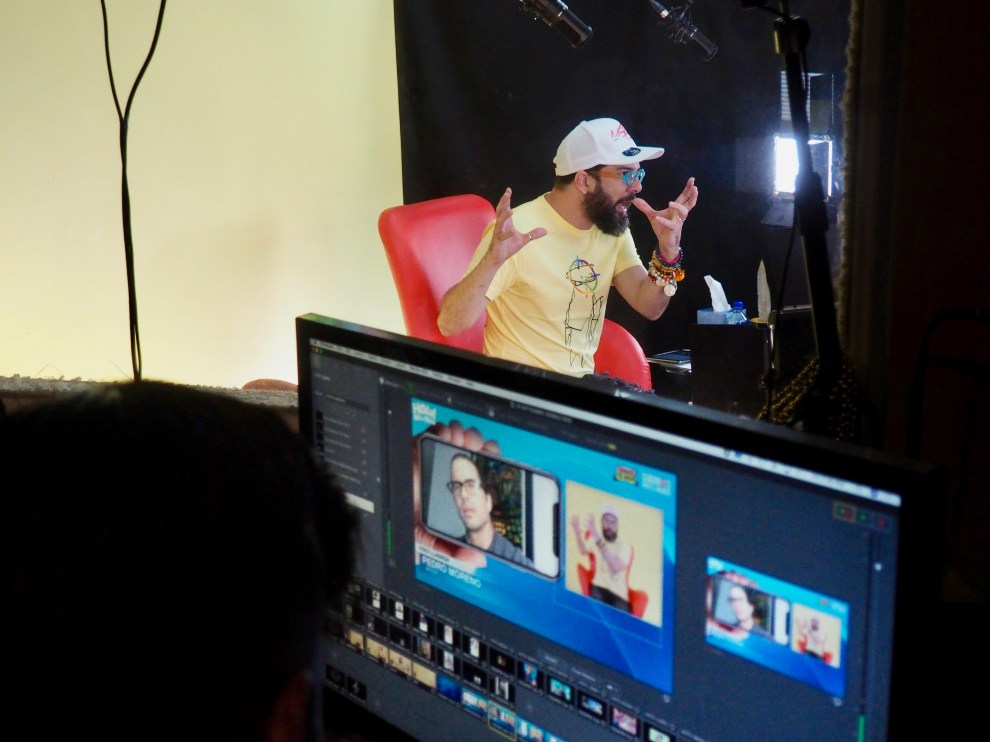
Otaola speaking to the Cuban actor Pedro Moreno.
A few days later, I showed up at the job fair at Salazar’s campaign office, watching as a disinfectant machine misted people on their way in. The volunteer working the sign-in table knew all about Otaola, down to the year he’d left Cuba.
Paredes, the Otaola superfan, proudly showed me a photo she’d taken with him. In the background, I recognized one of the fountains in the Four Ambassadors. She knew Otaola lived on the building’s 19th floor and that he’d been looking to upgrade to something nicer. Following his advice, she’d stopped sending money back to her family in Cuba, in the hopes of starving its government of revenue.
Paredes recounted the feeling of getting sucked into his orbit. “Tomorrow, I’m going to see what he’ll be talking about,” she said. “And then the next day. And the next day. And you don’t realize. Then you’re watching the show every day.”








